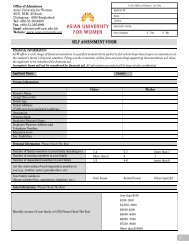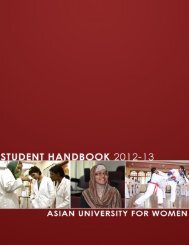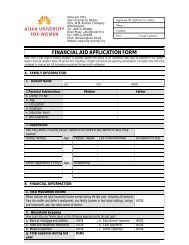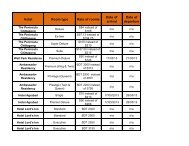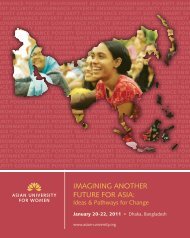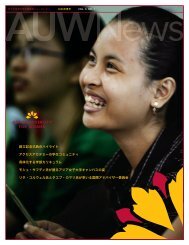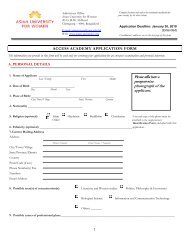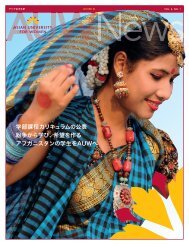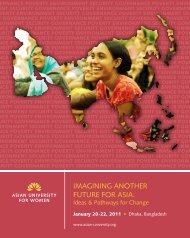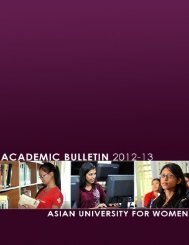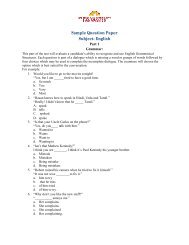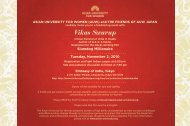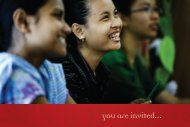Fall 2010 - Asian University for Women
Fall 2010 - Asian University for Women
Fall 2010 - Asian University for Women
Create successful ePaper yourself
Turn your PDF publications into a flip-book with our unique Google optimized e-Paper software.
12<br />
OCTOBER <strong>2010</strong> VOL. 4, NO. 2<br />
An AUW Student Reports on <strong>Women</strong>’s Issues in Bangladesh<br />
Canada that serves as a <strong>for</strong>um <strong>for</strong> young people<br />
across the globe who wish to speak out on the<br />
issues of the day (http://www.dispatchesinternational.org).<br />
Kaushi applied, but given her limited<br />
experience writing in English, she doubted she<br />
would get the position.<br />
It is winter in Bangladesh and the end of the year<br />
has ushered in an un<strong>for</strong>giving bout of cold<br />
weather. In this part of the world, cold weather<br />
means more than merely an extra sweater; as<br />
temperatures drop below 40 degrees Fahrenheit,<br />
newspapers across the country report on the dire<br />
condition of street dwellers who spend their<br />
nights sleeping outdoors.<br />
The effects of the cold snap can be seen in the<br />
plastic surgery and burn unit of this Dhaka hospital,<br />
where a lack of sufficient beds leaves patients<br />
stretched out on the cold floor with nothing<br />
more than a thin bedsheet as covering. The wails<br />
of a young girl, her <strong>for</strong>earms raw with burns, fill<br />
the ward as her mother explains that she cannot<br />
af<strong>for</strong>d the cost of painkillers. The scene would be<br />
daunting <strong>for</strong> even an experienced reporter, and<br />
Kaushalya Ruwanthika Ariyathilaka (“Kaushi”),<br />
just 22 years old, is neither a professional<br />
reporter nor a hospital staff member. But she is a<br />
student from the <strong>Asian</strong> <strong>University</strong> <strong>for</strong> <strong>Women</strong><br />
(AUW), and she is determined to get her story.<br />
At the start of winter break, Kaushi and her<br />
friend, a fellow AUW student from Bangladesh<br />
who came along to serve as a translator, boarded<br />
a train headed <strong>for</strong> the capital city of Dhaka.<br />
Using their own money to purchase train tickets,<br />
the AUW students set out <strong>for</strong> a three-week journey<br />
that promised to leave an indelible mark on<br />
two young women standing at the intersection of<br />
the classroom and their future careers. Kaushi<br />
was on assignment from the Canadian journal<br />
Dispatches International to investigate the issue<br />
of acid attacks against women, one of eight feature<br />
articles she plans to write on the challenges<br />
women face in the region.<br />
A native of Colombo, Sri Lanka, Kaushi is the<br />
daughter of a building contractor and a housewife.<br />
She is unassumingly driven and quietly<br />
passionate about her experiences as a student<br />
reporter. She explains: “When I read about<br />
things, I can’t <strong>for</strong>get them … I know I can’t do<br />
anything, because I don’t have the means to. But<br />
maybe the little thing I’m doing will do something<br />
<strong>for</strong> the people.”<br />
As an Access Academy student at AUW, Kaushi<br />
volunteered to take part in a cyber-mentoring<br />
program that AUW offers in conjunction with the<br />
<strong>University</strong> of Toronto in Canada. The program<br />
was designed to allow AUW students from both<br />
the Access Academy and the undergraduate programs<br />
to discuss mutual career goals and<br />
“When I read about things, I can’t <strong>for</strong>get them … I know I can’t do anything,<br />
because I don’t have the means to. But maybe the little thing I’m<br />
doing will do something <strong>for</strong> the people.”<br />
hobbies with student mentors half a world away,<br />
using online tools such as video chat and instant<br />
messaging. Some AUW students became particularly<br />
close with their mentors and, aided by the<br />
marvels of modern technology, managed to<br />
speak with their mentors frequently and even<br />
face to face. Kaushi’s mentor, a law student at the<br />
<strong>University</strong> of Toronto, encouraged her to apply<br />
<strong>for</strong> a position as a student reporter at Dispatches<br />
International, the quarterly publication of the<br />
International Partnerships Foundation (IPF) in<br />
KAUSHALYA RUWANTHIKA ARIYATHILAKA<br />
Kaushi did nonetheless go on to win a position<br />
as a reporter. Soon thereafter she also submitted<br />
an essay to the World Bank essay competition on<br />
climate change and was selected as one of the<br />
top 200 finalists from a pool of 2,500 candidates.<br />
“I never imagined I would write things like this,”<br />
she says. In the summer of 2009, she and her<br />
AUW classmate Mowmita Basak Mow attended a<br />
journalism conference hosted by the IPF in<br />
Canada. The conference brought together aspiring<br />
reporters from 11 countries around the world,<br />
including Canada, the United States, Germany,<br />
Moldova, Mexico, Argentina, Brazil, Costa Rica,<br />
Ecuador, Sri Lanka and Bangladesh. “It was so<br />
nice to meet people from so many different<br />
places in the world,” Kaushi gushes. The conference<br />
provided workshops on photojournalism,<br />
research techniques, and how to write feature<br />
articles. Kaushi stayed with the family of a <strong>for</strong>mer<br />
Access Academy teacher of hers <strong>for</strong> the entire<br />
three-week visit, demonstrating the far reach of<br />
AUW’s still-nascent network.<br />
Kaushi’s investigation of acid attacks led her from<br />
Chittagong to Dhaka and into this hospital ward.<br />
She has interviewed professors at Dhaka<br />
<strong>University</strong>; met with police officers at the local<br />
station; and traded statistics with staff members<br />
at an NGO that caters to burn victims. In each<br />
instance she has relied on pure gravitas and<br />
determination to get her interviews; most, if not<br />
all, of these interviews were a result of her knocking<br />
on one door, then another, until she found<br />
the person who was willing to help her. She has<br />
also faced down dissenters who would prefer she<br />
not investigate this topic at all, like the doctor<br />
who refused to grant her an interview, insisting<br />
that she must receive permission from the courts<br />
or from the police first.<br />
Kaushi ignored his warnings<br />
and marched up to the director<br />
of the hospital instead,<br />
who agreed to the interview.<br />
Most important, Kaushi has<br />
spoken with the victims<br />
themselves. In a powerful<br />
example of the impact AUW<br />
hopes to have in the region, Kaushi has displayed<br />
the remarkable ability to connect with the<br />
victims on a personal level, transcending the<br />
boundaries of suspicion and fear to grant a voice<br />
to this perpetually marginalized segment of the<br />
population. For her article on the issue of dowry<br />
violence, Kaushi was able to interview women in<br />
their homes be<strong>for</strong>e their husbands came home.<br />
“[The women] were scared all the time. [But] we<br />
were also girls, so they were free to talk,” Kaushi<br />
says. Her role as a student reporter ultimately



